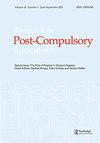非传统学生向高等教育过渡的困难和支持
IF 0.9
Q3 EDUCATION & EDUCATIONAL RESEARCH
引用次数: 5
摘要
摘要本文探讨了非传统学生在1992年后的大学一年级过渡到体育锻炼课程时所经历的困难和支持。向高等教育的过渡为学生带来了同时发生的教育、生态和发展变化,他们驾驭变化的能力可能会影响课程的体验、满意度和参与度。16名学生在第一学年接受了两次采访。研究结果表明,尽管学生对自己的学习仍然持乐观态度,但他们对过渡期感到焦虑,对学业潜力的自我效能感较低。社会因素对他们的进步有积极影响,尤其是来自同龄人的支持。与员工和同事的关系支持过渡,有效的入职培训受到赞扬。学生支持服务受到学生的支持。在工作量、工作人员可用性和寻求支持的犹豫方面遇到了困难。建议支持1992年后院校和非传统入学者向高等教育过渡。本文章由计算机程序翻译,如有差异,请以英文原文为准。
Difficulties and support in the transition to higher education for non-traditional students
ABSTRACT This paper explores the difficulties and support experienced by non-traditional students during their first-year transition to a sport and exercise course at a post-1992 university. The transition to HE presents simultaneous educational, ecological and developmental changes for students and their capability to navigate changes may affect experience, satisfaction and engagement with courses. Sixteen students were interviewed twice during their first academic year. Findings indicate that students feel anxious about the transition period, with low self-efficacy surrounding their academic potential, despite still being optimistic about their learning. Social factors positively impact their progression, especially the support from peers. Relationships with both staff and peers support transition, with an effective induction praised. Student support services were praised as supportive by students. Difficulties were experienced regarding work-loading, staff availability, and a hesitancy to seek support. Recommendations are made to support post-1992 institutions’ and non-traditional entrants’ transition to Higher Education.
求助全文
通过发布文献求助,成功后即可免费获取论文全文。
去求助
来源期刊

Research in Post-Compulsory Education
EDUCATION & EDUCATIONAL RESEARCH-
CiteScore
1.30
自引率
14.30%
发文量
31
期刊介绍:
Throughout the world, there is a growing awareness of the significance of vocational and post-compulsory education and training systems. The majority of countries are working hard to develop their provision, recognising the importance of post-compulsory education in providing educated and skilled people in sufficient numbers at appropriate levels to assist economic and social development. Research in Post-Compulsory Education, sponsored by the United Kingdom"s Further Education Research Association (FERA), recognises the need for more international research and analysis and the generation of relevant theory in order to identify policy needs and trends as well as priorities in this growing area.
 求助内容:
求助内容: 应助结果提醒方式:
应助结果提醒方式:


